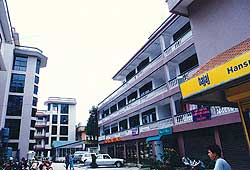 In 1987, a one-room road-front shop selling cheese, curd and bottled drinks opened in Kathmandu's Bhatbhateni. The owner, then a clerk at the New Road branch of the state-owned Nepal Bank, had rented the room together with his wife who ran the shop.
In 1987, a one-room road-front shop selling cheese, curd and bottled drinks opened in Kathmandu's Bhatbhateni. The owner, then a clerk at the New Road branch of the state-owned Nepal Bank, had rented the room together with his wife who ran the shop. From the beginning, Min Bahadur Gurung, with no previous background in business and the only member of his extended family not to join a foreign armed services, understood four things: first, the business he was in was not new, second, there were hundreds of such stores all over Kathmandu, third, he has to think of new ways to differentiate his store from those of his competitors' and, fourth, Bhatbhateni-with expensive-looking houses in the neighbourhood and located on the way to other posh residential areas-would be where a convenience store do rather well.
Fast forward to 2004. The one-room shop has evolved into a giant multi-storied supermarket with a large parking lot. It sells everything from groceries, designer clothes to expensive jewellery and even treadmills. Up to 5,000 people come everyday, making Bhatbhateni Super Market the busiest single shop in the Valley. It employs over 200 salespersons, drawn mostly from the villages of Khotang in eastern Nepal, the owner's home district.
Though old and new competitors remain, Bhatbhateni has made a name for itself in terms of accessibility, choices, quality, value for money and service. What could be some lessons that aspiring Nepali entrepreneurs can draw from Gurung's experience?
Small start: Starting small is unglamorous. But it pays off in the long run, especially if one is ambitious to grow big. Mistakes committed when a business is small are not big: they can easily be corrected and lessons are learned without wasting much money and time. Most Nepali start-ups fail-and fail spectacularly-because entrepreneurs are almost offended to think small.
Credibility: Even when his store burned down in 1993, Gurung paid all his suppliers. This act, he said, enhanced his credibility. Making a quick buck at the hapless customers' expense may be tempting, but the market rewards those who project consistently trustworthy actions. People, after all, buy and sell with those they trust.
Curiosity: Gurung knows his sales staff need better training, and that his management systems need to be professionalised. He seemed most at ease when talking about issues he did not know. This paradoxical trait is noteworthy in business because it keeps entrepreneurs humble-they ask questions, learn and strive to buy and sell better. You know a business is going downhill when owners start exhibiting a know-all attitude and are closed to different viewpoints.
Focus: Gurung is clear about his focus-to sell Nepali and foreign goods at the lowest possible prices. He avoids distractions. For instance, he does not appear as a talking head on the television. He does not dissect macroeconomic policies. And he does not hog the limelight at Chambers of Commerce gatherings. All he knows is how to sell, and has succeeded by doing only what he does best.



